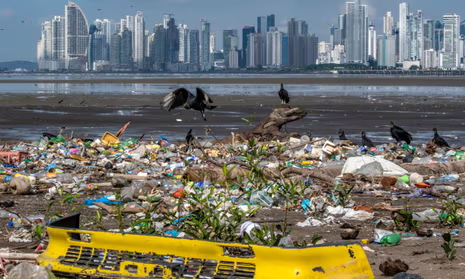Negotiators convened in Canada for the fourth round of discussions on a landmark global treaty aimed at combatting plastic pollution, representing a crucial step forward in international efforts. This gathering underscored a significant milestone in the negotiation process, with attention shifting towards the formulation of the treaty’s text—a pivotal moment indicative of tangible progress. The engagement of delegates in crafting the agreement’s language signals a transition from broad conceptual frameworks to actionable measures, reflecting a growing consensus on the urgency of addressing plastic pollution on a global scale. Against the backdrop of escalating environmental concerns, the convergence of nations and stakeholders in this forum signifies a shared commitment to confronting one of the most pressing challenges of our time. As deliberations unfold, the world watches with anticipation, recognizing the potential impact of this treaty in shaping a more sustainable future for generations to come.
Shift Towards Treaty Language
The recent negotiations witnessed a historic shift as delegates delved into the intricate task of drafting the text for the proposed treaty—a departure from previous rounds focused on conceptual frameworks. This pivotal development represents a decisive step towards transforming overarching objectives into concrete, enforceable measures. Participants embraced this transition with optimism, recognizing it as a crucial advancement in the trajectory of the negotiation process. By immersing themselves in the nuanced language of the treaty, delegates demonstrated a collective commitment to translating lofty aspirations into tangible policies and regulations. This shift not only reflects the growing momentum behind global efforts to tackle plastic pollution but also underscores the seriousness with which stakeholders approach the task of addressing this urgent environmental challenge.
Contention Over Plastic Production Limits
At the heart of the discussions lay a contentious debate over the inclusion of provisions aimed at curbing plastic manufacturing—a topic that sparked intense disagreement among participating nations and industry stakeholders. Despite fervent objections from plastic-producing countries and companies, proponents of the measure successfully advocated for its retention in the treaty’s text. This decision underscored the profound rift between environmental imperatives and economic considerations, illuminating the complex dynamics at play in addressing plastic pollution. While concerns over potential economic ramifications loomed large, proponents of limiting plastic production emphasized the urgent need to prioritize environmental sustainability. The retention of this provision reflects a bold commitment to confronting the root causes of plastic pollution, even in the face of staunch opposition from vested interests.
Continued Work Towards Finalization
As the curtains closed on the Ottawa session, the committee reaffirmed its dedication to advancing the treaty’s formulation ahead of the impending final gathering in South Korea later this year. With unwavering resolve, stakeholders pledged to intensify efforts in critical areas such as financing implementation, scrutinizing harmful chemicals present in plastics, and devising innovative product design strategies. This resolute commitment underscores a collective determination to surmount remaining challenges and forge a comprehensive framework capable of effectively combating plastic pollution on a global scale.
Industry Opposition and Advocacy Efforts
Amidst the negotiations, plastic producers and industry representatives stood firm in their opposition to the proposed production caps, asserting the importance of prioritizing recycling and reuse initiatives as alternative solutions. Conversely, scientists aligned with the Scientists’ Coalition for an Effective Plastics Treaty actively countered misinformation, presenting compelling evidence to underscore the urgency of addressing plastic pollution. While industry stakeholders emphasized the need for sustainable practices within the existing framework, scientific voices underscored the imperative for systemic change to effectively mitigate the environmental impact of plastic waste. This dynamic exchange highlights the divergent perspectives shaping the discourse surrounding the treaty’s development and underscores the complexities inherent in reconciling economic interests with environmental imperatives.
Global Perspectives on Treaty Importance
Representatives from diverse nations converged with a unified vision, emphasizing the paramount significance of advancing the treaty process to safeguard the planet’s future. Amidst differing viewpoints, a resounding consensus emerged, underscoring the indispensable role of multilateral cooperation in addressing the looming threat of plastic pollution. This shared commitment transcended geopolitical divides, reflecting a global recognition of the urgent need for concerted action to mitigate the environmental degradation wrought by plastic waste. As delegates navigated through nuanced negotiations, the collective resolve to confront this pressing challenge underscored a shared responsibility towards fostering sustainability and preserving the integrity of ecosystems for present and future generations.
Voices of Affected Communities and Indigenous Peoples
Communities profoundly affected by the devastating repercussions of plastic pollution, particularly those residing in close proximity to manufacturing facilities, alongside Indigenous groups, raised their voices in a resolute call for decisive action. Their impassioned advocacy underscored the imperative for their meaningful inclusion in decision-making processes, emphasizing the preservation of ancestral lands and traditional ways of life as paramount. Despite strides towards advancing the global treaty, significant challenges persist as stakeholders grapple with the intricate complexities inherent in addressing this multifaceted issue. Navigating divergent interests and seeking consensus on effective solutions remain formidable tasks. Yet, amidst these challenges, the unwavering determination of affected communities and Indigenous peoples serves as a poignant reminder of the urgency and necessity of collective action in combating plastic pollution and safeguarding the planet for future generations.

